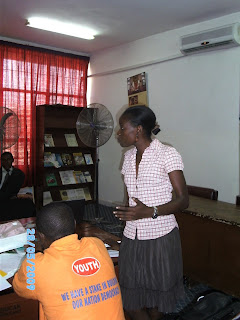
The International Youth Peace Tourism Ambassadors (IYPTA), an initiative of International Youth Peace Tourism & Development Initiative (IYPTDI) was founded with a global mindset to raise action-oriented, dynamic young men and women from all the nations of the world to lead in the change process of making a difference in our world. Embodying the universal and shared principles of first being, as to create substantial change that will usher in a new global era of young people leading in local and international peace building processes mainstreamed through tourism and all fields of life and development, rural and urban, private sector and government, e.t.c.
The appointment of notable young people unto this global platform is designed as an annual international event. Nominated youths, pre-screened from different communities, culture and race around the world, those already serving and making a difference in their constituencies are confirmed and appointed as Youth Peace Tourism Ambassadors. A renewed sense of purpose and commitment is emphasized to address the more pressing development issues affecting young people such as Poverty and others as outlined in the Millennium Development Goals (MDG's).
Over the past decades, various issues have confronted Africa, seriously threatening the very existence of the upcoming youth generation. In Nigeria issues of youth restiveness in the Niger Delta Region, escalating cases of crime and violence in South Africa, civil wars in Cote D'Ivore and Liberia, genocide in Rwanda and others of which we hear of everyday also happening in many other regions of the world.
Although the Niger Delta Oil Rich Region produces immense oil rich wealth for our country and has since become the engine room and mainstay of Nigeria's economy, the region can unfortunately not boast of any real dividend in infrastructure or the well being of her people, especially the youth. The region presents a paradox. Her vast resources have not corresponded in touching the lives of the people's own local poverty. Consequently these and other formidable challenges have impeded the development of the region, which has resulted to marginalization, fear of extracts from the Nigerian polity, resentment against other ethnic nationalities and multi-national corporations. Today, the cumulative effects of these have created cases of random kidnappings, general apprehension and insecurity of the area and obviously a visible threat to national peace, Security and unity. Despite the creation of government interventions such as Niger Delta Development Commission (NDDC) and now the newly created Niger Delta Ministry, The question is “what tangible and substantial hope lies ahead to resolve the crucial concerns of the region?
Youths all over the world especially in the less developed countries are always victims of violence either by choice, force or manipulations by selfish leaders as a means of survival.
The further lack of quality “role models” and mentors among the parent generation and some of our political leaders have not met the expectations of the younger generation, has been seen among the youth as a “betrayal” of their destiny. The youth (who form the majority i.e 60% of the world’s population), from rural communities to urban cities and their surround, have also met with many tumultuous challenges and disappointments, the harsh reality of today’s difficult and global economic recession have resolve to violence as a way of life.
In order to address these issues and provide lasting solutions that can create a ‘paradigm shift’ from the present challenges faced by the youth in both the developed and less developed world, it became imperative that we lay a foundation for posterity by rekindling faith in the youth for creative developments, rebuild their self esteem and confidence through the strategic platform of the INTERNATIONAL YOUTH PEACE TOURISM AMBASSADORS at all levels right to the grass roots to act as and represent the hope of a desirable future and as “role models” in the “global leadership community.” Incidentally, youth, tourism and peace development concerns are multi-sectored, i.e. they affect every sector of human endeavor globally. Therefore the IYPTA General Assembly is the annual forum where Ambassadors critically consider and resolve on key issues, that will advance the platform's local and global agenda in line with current development trends and innovations designed to introduce youths and or young people at all levels of decision making, to the emerging but powerful concept of “building a culture of peace through Tourism” as a strategy to address real life root causes of the primary youth challenges such as poverty, violence, e.t.c.
In October 2008 at the Reiz Continental Hotel, Abuja, a pioneer set of Change Agents of our great country, Africa and the world were honored with appointments as prestigious International Youth Peace Tourism Ambassadors (IYPTA's),. Now this incredible and unprecedented initiative is set to soon become a global network of youth leaders from all walks of life mainstreaming YOUTH PEACE TOURISM to “Make A Difference” and “Be The Change” in our world.
IYPTDI sincerely believe that the IYPTA initiative can do so much to play a strategic role in partnering with government and other development partners to reposition the region for effective development change that will obviously make a difference in the Niger Delta Region. Already we have a handful of notable and dynamic Youth Peace Tourism Ambassadors who have taken this as a challenge and we must support them. Our distinguished friend and colleague Hon. Ambassador Sunny-Goli, Special Adviser to the Executive Governor of Bayelsa State on Youth Matters, who led a sizeable delegation of Bayelsa Youth leaders to the inaugural ceremony and leadership seminar last year, in Abuja, had announced that Bayelsa State Government will take the Privilege to host this year's International Youth Peace Tourism Ambassadors Award 2009, come October 30TH, 2009 and we have given them the hosting rights in principle.






















